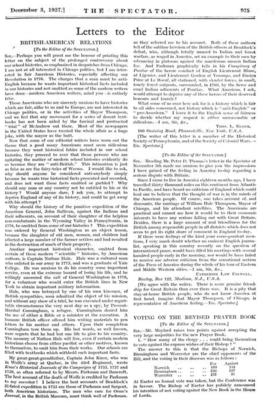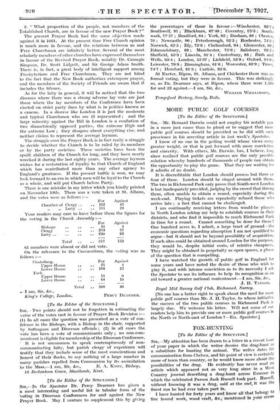VOTING ON THE REVISED PRAYER BOOK [To the Editor of
the SPECTATOR.] Maylard raises two points against accepting the very large, majorities for the new Prayer Book.
1. " How many of the clergy . . . could bring themselves to vote against the express wishes of their Bishop ? "
The answer to this is that the Bishops of Norwich, Birmingham and Worcester are the chief opponents of the Bill, and the voting in their dioceses was as follows :
For Against Norwich ..
.. 199 114 Birmingham ..
.. 236 147
Worcester .. . • .. 162
31
At Exeter no formal vote was taken, but the Conference was in favour. The Bishop of Exeter has publicly announced his intention of not voting against the New Book in the House of Lords. 2. " What proportion of the people, not members of the Established Church, arc in favour of the new Prayer Book ?"
The present Prayer Book had the same objection made against it in 1661. At the present time Free Church opinion is much more in favour, and the relations between us and Free Churchmen are infinitely better. Several of the most scholarly members of other churches have expressed themselves in favour of the Revised Prayer Book, notably Dr. Carnegie Simpson, Dr. Scott Lidgett, and Sir George Adam Smith. There is, in fact, a great body of intelligent support among Presbyterians and Free Churchmen. They are not blind to the fact that the New Book authorizes extempore prayer, and the members of the Society of Friends are aware that it includes the Silence.
As for the laity in general, it will be noticed that the two dioceses where there was a strong adverse lay vote are just those where the lay members of the Conference have been elected on strict party lines by what is in politics known as a caucus. In a diocese like London it is just the moderate and typical Churchmen who are ill represented ; and the large minority against the Bill in London is a conflation of two diametrically opposed parties, the extreme High and the extreme Low ; they disagree about everything else, and -neither claims to represent the average layman.
The struggle over the Prayer Book is in fact really a struggle to decide whether the Church is to be ruled by its members or by the party societies. These societies have been the spoilt children of the Church for long, and they have nearly wrecked it during the last eighty years. The average layman wishes for a restoration of loyalty to that Church of England which has contributed more than any other agency to England's greatness. If the present battle is won, we may look forward to an era in which men will be loyal to the Church as a whole, and will put Church before Party.
There is one mistake in my letter which you kindly printed on November 19th. There was a vote taken at St. Albans,
and the votes were as follows :— For Against Chamber of Clergy .. .. 162 42 Laity .. .. 111 28
Your readers may care to have before them the figures for the voting in the Church Assembly :— For Against Bishops • • • • .. 34 4 Clergy
.. 253 37 Laity
• • .. 230 92
Total , , ,. 517 133 61 members were absent or did not vote.
On the reference to the Convocations, the voting was as follows :-
Canterbury.
For Against Upper House • .
21 4 Lower House ; ; : 168 22
York.
Upper House Lower House
• • ; ;
11 68 0 10
Total .. 268 36 .—I am, Sir, &c.,











































































 Previous page
Previous page